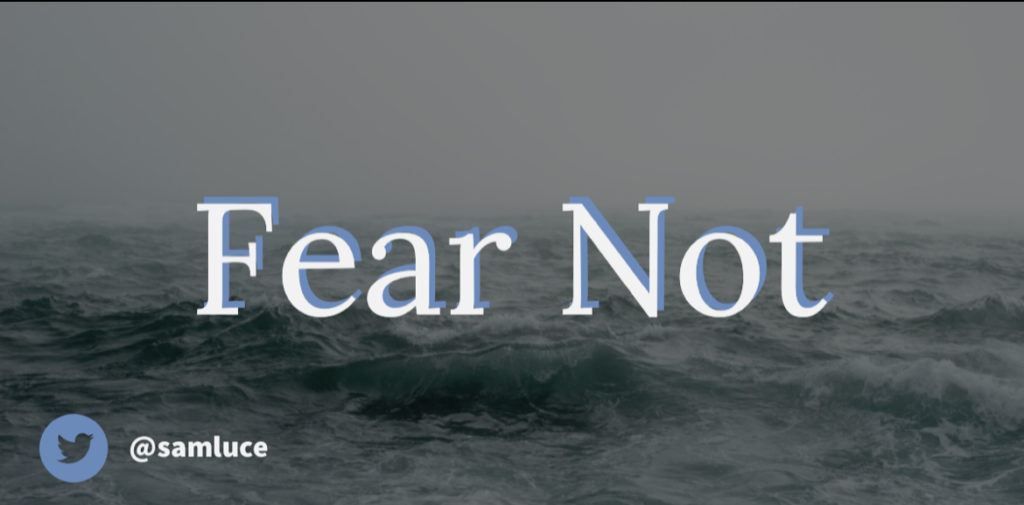In a culture where fear is ever-present and all-pervasive, we turn to almost anything to find comfort and to find help. There are a million things to be afraid of thanks to the internet and COVID; that number has tripled.
One of the most repeated phrases in scripture is “fear not” “Do not be afraid.” It’s almost as if the God who created us knows us and knows that much of what we do is driven by the blasphemy of pessimism. This idea is that things are worse than we imagine that things will not end well and that the worst possible thing that can happen will happen. We are plagued by these doubts all the time. Daily we read of people who are being oppressed and killed around the world we know people around us who are struggling with addictions and sorrows. People we love dying of covid, cancer, and suicide takes a toll on our soul.
The answer that we are given to combat this fear is false optimism. We are told to think happy thoughts, to avoid people with negative energy. In the church, it isn’t much better. Many famous churchmen say that positive confession changes things that our words create in the same way God created the world with his word. We are given the same false optimism the world offers only in attractive wrapping paper called faith.
The problem with the false optimism the world offers us is that it avoids the difficulty through distraction. The problem with the false optimism the church offers as Chesterton says is that it tries “to prove that we fit in to the world.” We have an idea of how the world should be and to avoid the blasphemy of pessimism we settle for a cheap false optimism. We see the broken world needing mending a world and a life that if not cared for can be lost. We fail to see and understand that this world and this life were never ours they were never our possessions. They are signposts of another world.
Gerard Manley Hopkins says it this way.
The world is charged with the grandeur of God.
It will flame out, like shining from shook foil;
It gathers to a greatness, like the ooze of oil
Crushed. Why do men then now not reck his rod?
Generations have trod, have trod, have trod;
And all is seared with trade; bleared, smeared with toil;
And wears man’s smudge and shares man’s smell: the soil
Is bare now, nor can foot feel, being shod.
Our world is filled with the grandeur of God, charged with his glory. It isn’t great because He created it but because it continues to carry the beauty and glory of who he is from beginning to end. Its job is to point us to what can really help us in the middle of pandemics and pain. We are not citizens of this world. We were made for another world. This world despite the evil that men have done that despite the world bearing the smell of man and his sinful self-inflicted pain.
Hopkins finishes his poem this way:
And for all this, nature is never spent;
There lives the dearest freshness deep down things;
And though the last lights off the black West went
Oh, morning, at the brown brink eastward, springs —
Because the Holy Ghost over the bent
World broods with warm breast and with ah! bright wings.
Hopkins says despite our best attempts to destroy the world we live in God’s creation is “never spent.” We have hope in two things. The first is that the God who created this world broods over it saturates it with his grace. God is watching over our world he is not distant he is close he is “bent over” not standing afar off and he ordains all things according to the counsel of his will. You are not your own and you are not alone.
Chesterton in Orthodoxy helps us from 100 years ago telling us that we were made for another world.
“The optimist’s pleasure was prosaic, for it dwelt on the naturalness of everything; the Christian pleasure was poetic, for it dwelt on the unnaturalness of everything in the light of the supernatural. The modern philosopher had told me again and again that I was in the right place, and I had still felt depressed even in acquiescence. But I had heard that I was in the wrong place, and my soul sang for joy, like a bird in spring.”
The second is this world is not our home and our lives are not our own. When I heard I was in the wrong place my soul sang for joy. So powerful. If you have put your faith in Christ you are in the wrong place. So much of the fear we experience comes from a fear of losing was is temporal and failing to see that our lives are eternal. The revelation that this world is not our home and our lives are not our own should produce in us contentment in this life and at the same time discontented homesickness for the next.


Pingback: "Fear Not": The Signpost of Another World